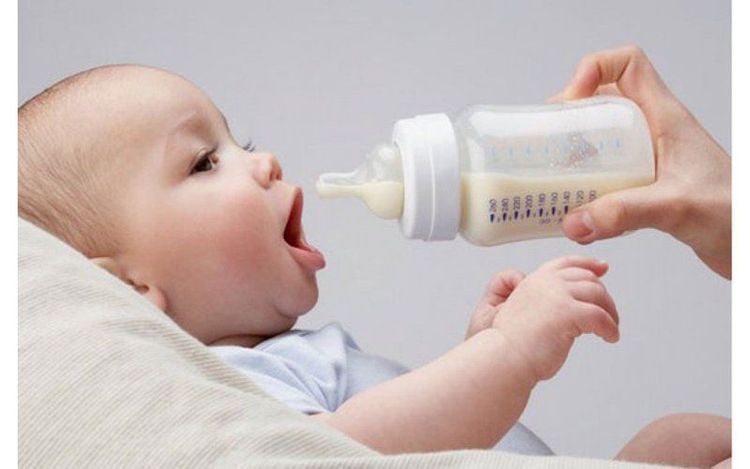This is an automatically translated article.
We all know waking up at night to care for or feed our new baby is part of motherhood, and nighttime breastfeeding can be an act. most peaceful and wonderful. However, there comes a time when the importance of your and your baby's sleep takes precedence over all those nightly feedings. So when can you stop feeding your baby at night? This is the question most parents ask.1. Should children eat at night?
Feeding or not feeding children in the middle of the night - that is the question of many parents, especially those who are first time parents. Experts agree that if your baby is younger than 6 months old, you should feed him whenever he wakes up at night.But once your baby has passed the 6 month mark, skip the midnight snack. The goal is to separate eating from bedtime so that if your baby wakes up at night, he won't need your breast or your bottle to go back to sleep.
Most toddlers do not need night feedings for normal development. In general, toddlers will get all the nutrition they need through meals during the day, whether they're breastfed or formula-fed.

2. Number of nighttime meals of children by age
Many babies will continue to wake up at night to feed until they are two or three years old. Children 2-3 years old are past the age of needing to feed, they eat at night just because their small body is used to night calories.Often these feedings hang around because they are also related to sleep, babies may require feedings to fall asleep. This means your baby may wake up at the end of every 60-90 minute sleep cycle and need to eat to get back to sleep, even if he doesn't need to eat anymore. Sometimes this feeding can be just a short-lived comfort and sometimes it can maintain calorie intake when it's not needed.
Before taking steps to reduce the number of feeds, you need to make sure that you are asking your baby to do something he can achieve! If your baby is healthy and gaining weight well, determine how many feedings your baby may need at night based on the chart below. The chart shows common nocturnal feeding patterns and reasonable expectations for infants during the first year.
Also, you should always check with your pediatrician to make sure your baby is ready to eat less at night and always adjust to your baby's age based on date of birth. If your baby is eating more than is indicated on this chart, and you are feeling and satisfied with your condition, you should have no problem reducing your baby's nightly feedings. If your child is eating less and your pediatrician is satisfied with the weight gain and growth, that means he doesn't need nightly meals anymore.
Trắc nghiệm: các chỉ số cần chú ý về sự phát triển thể chất của trẻ
Chiều cao, cân nặng của bé ở từng giai đoạn nên là bao nhiêu là bình thường, bao nhiêu là bất thường? Cùng ThS.BS Ma Văn Thấm điểm lại xem bạn đã nắm được các chỉ số phát triển thể chất của bé chưa nhé!The following content is prepared under supervision of Thạc sĩ, Bác sĩ y khoa, Ma Văn Thấm , Nhi , Phòng khám Đa khoa Quốc tế Vinmec Dương Đông(Phú Quốc)
Infants 0 - 2 months: Exclusively breastfed babies need 3 - 5 feedings per night. Formula-fed babies need 2-4 feedings per night. Note: infants need to be fed throughout the day, children should not be starved for more than 4 hours, the best way is to feed them on demand and meals should not be more than 3 hours apart. Babies 3 - 4 months old: Exclusively breastfed babies need 3 - 4 feedings per night. Formula-fed babies need 2-3 feedings per night. Pay attention to your baby's sleep during the first 4 months. If your child is suddenly waking up more often, it may have less to do with the need to eat, and more often to do with varying sleep patterns. Children 5 - 6 months old: Exclusively breastfed babies need 1-3 feedings per night. Formula-fed babies need 1-2 feedings per night. You can see that your baby's nighttime feedings are starting to decrease at this point, as well as his sleep patterns have changed. At this age, most babies sleep less during the day and will take a long nap at night. Babies 7 - 9 months old: Exclusively breastfed babies need 0 - 3 feeds per night. Formula-fed babies need 0 - 1 feedings per night. Experts have found that most formula-fed babies by this point have started weaning at night. They also recommend that all babies who are both breastfed and formula-fed can be weaned at this stage, if that makes it comfortable for you and your baby.

3. When can wean children at night?
It's really not that simple to know exactly when your baby is ready for night weaning. The timing of night weaning is different for every baby. This is very age dependent, but we cannot make a simple decision that your baby is at this age to be weaned at night.Because in addition to the age of the child, night weaning also needs to take into account the child's health factors. A newborn baby may need a longer night feed than another, especially if they have health problems.
In addition, night weaning for babies sometimes depends on parental preferences. A mother may want to continue to breastfeed at night even when they are no longer needed, simply because she loves that special time with her baby.
However, the question of night weaning time for children is of interest to many parents, so it is necessary to have a basis to determine this time relatively. You can gauge if your baby is ready for night weaning by answering the following 5 questions:
Does your baby only wake 1-2 times a night to feed? Does your baby always fall asleep right after feeding? Does your baby not need to breastfeed to fall asleep? Has your child eaten 3 meals of porridge a day? Is your child under 9 months old? By answering these questions, you can determine if your baby has reached the point of needing night weaning or if he needs a little more time to do so.

4. What should you do if your child still wants to eat at night?
What should you do if your child still wants to eat at night? Here's advice from child psychologist and sleep expert Jodi Mindell, experts at the American Academy of Pediatrics, and pediatricians Richard Ferber, T. Berry Brazelton, and William Sears .According to Mindell: At this age, your child needs to be provided with enough nutrition during the day so that he does not need to eat at night. You can make it harder for your baby to fall asleep if you continue to breastfeed or bottle-feed your baby while he's awake at night. If you are breastfeeding, gradually shorten the duration of breastfeeding. Vary breastfeeding times so that it's not close to your baby's bedtime, and have someone else put her to bed so she doesn't smell your milk.
You can cut out bottle feeding by reducing your formula intake to 1 ounce (about 28g) of milk per night.
Another expert said: if your child is used to eating a lot at night, it's time for a gradual re-training. For example, if you gave your baby milk when he wakes up, dilute the milk or switch to water and gradually stop giving him anything. Babies need to learn that nighttime is for sleeping. Ferber's point: try not to associate feeding with bedtime. If your baby falls asleep while eating, stop and put him in the crib. As your baby gets older, gradually reduce the frequency and frequency of feedings. Brazelton's point: if your baby still wants to finish the bottle, you can make it part of your bedtime ritual, along with a story and so on. At this age, babies need comfort and relaxation more than anything else. Sears' point: you need to try to teach your child more ways to fall asleep that don't involve eating so he's not tied to needing food to help him sleep. For example, you could give your child a bottle of milk in a rocking chair and then help him or her hold a transitional object, such as a teddy bear. Then move your baby and teddy bear to bed, but leave the bottle alone.
.

Experts recommend trying to wean at night as late as 8-9 months old, or earlier if you feel your baby is ready. Because this can affect the child's daytime need to eat.
Children need a certain amount of calories during the day, but if they already get some of these calories at night, they won't eat more during the day. And when children don't eat more during the day, they will need to eat more at night. This will create a vicious cycle that never stops.
That's why, sometimes babies really feel hungry at night, but that doesn't mean they can't go to sleep all night without a feed. You simply need to adjust your child's daytime intake, you need to be patient to do this. Thereby will help you and your baby have a longer and better night's sleep.
For children to be healthy and develop well, it is necessary to have a nutritious diet in terms of quantity and quality balance. If children are not provided with adequate and balanced nutrients, it will lead to diseases of excess or lack of nutrients, which adversely affect the comprehensive development of children in terms of physical, mental and motor skills.
Children who do not eat properly are at risk of micro-mineral deficiency causing anorexia, growth retardation, malabsorption,... If they notice the above signs, parents should supplement their children with products. The supplement contains lysine, essential micro-minerals and vitamins such as zinc, chromium, selenium, and B vitamins to help fully meet the nutritional needs of children. At the same time, these essential vitamins also support digestion, enhance nutrient absorption, help improve anorexia, and help children eat well.
Parents can learn more:
Signs of zinc deficiency in children
Micronutrient deficiency and failure to gain weight in children
Please regularly visit Vinmec.com website and update useful information to take care of your child. Take care of the baby and the whole family.














